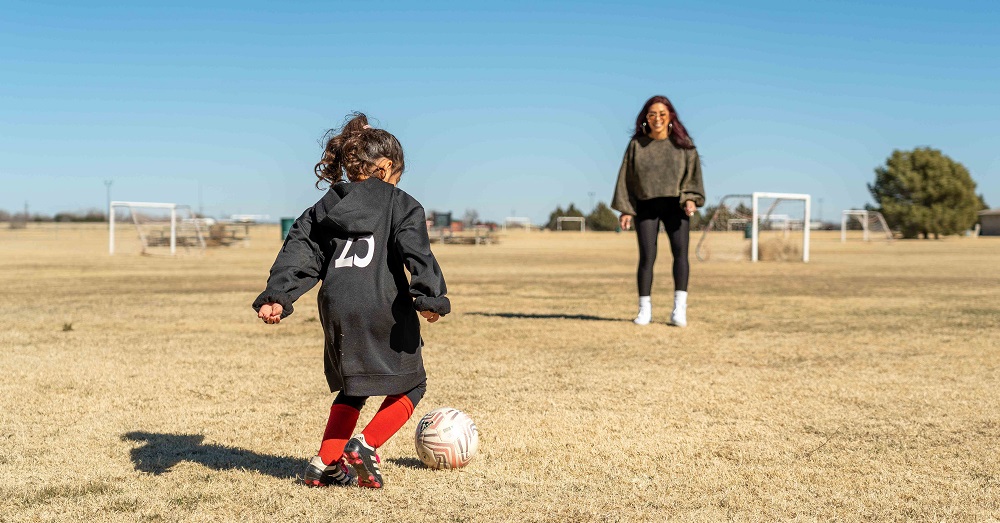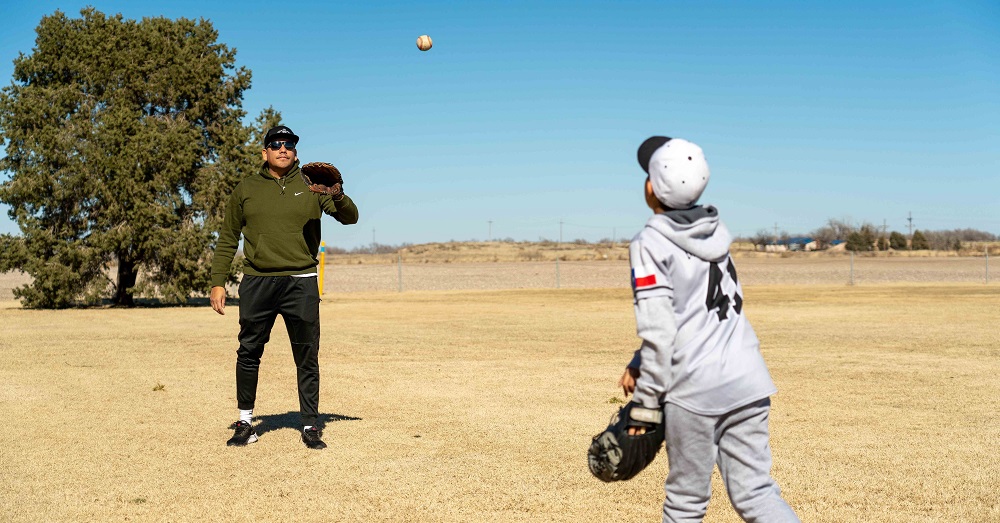Exercising with Your Family
Benefits to physical and mental health help lead to family bonding, kiddos doing better academically

Exercise can benefit children’s health and academics
It’s not too late to make a resolution to exercise more and spend quality time with your family. Combining both can lead to long-term benefits for you and your children’s health and their academics.
“I would say that probably the biggest reason that I would want parents to incorporate physical activity with their children is that children are going to practice what they see their parents doing,” Tammy Camp, M.D., Texas Tech University Health Sciences Center (TTUHSC) School of Medicine Pediatrics Residency director, and Texas Tech Physicians pediatrician, said. “If parents are not physically active, or they’re being physically active, but their kids never see it, then their kids don’t have the motivation or the understanding that exercise is an important part of life.”
Suzana Jensen, D.O., TTUHSC pediatric resident and former college student athlete, started bowling when she joined an adult/youth bowling league with her dad.
“I would also add that it’s a really great chance to bond between parent and child or whoever you’re active with,” Jensen said. “It’s a great chance to have fun and also stay active.”
Physical activity can start as early as a child’s newborn stage.
Camp said she teaches pediatric residents to talk to parents about the importance of tummy time. Being on the floor helps the infant develop stronger muscles and creates an opportunity for bonding as they’re lying on the floor, face to face.
“Spend time with that baby on the floor on their tummies so that those babies can start to develop those stronger muscle groups in their arms and their legs and their shoulders as they lift their necks,” Camp said.
Jensen introduced her stepson to bowling at an early age.

Seeing physically active parents can show children the value of exercise
“I have a 10-year-old stepson,” Jensen said. “He started bowling by just pushing the ball down the ramp. I think at one year old, pretty much as soon as he could walk, we started becoming active. Physical activity can start when you’re pregnant by just walking; it can start by pushing your child in a stroller. It just looks different depending on the stages of life.”
Physical activity also looks different for those parents or children who have disabilities or might be injured.
“I think that completely depends on what that injury is or what that type of disability may be,” Camp said. “I have a patient who is in a wheelchair and is a tremendous competitive archer.”
Camp suggested parents and children join the Challenger League, which is designed for kids with disabilities. Children participate with someone who is close to them, such as a parent or a mentor.
Parents with children in organized sports should still incorporate physical activity. Camp said it’s important for children to exercise daily so they can incorporate it in their lives.
“It may become a little bit more difficult, but there’s still an opportunity for parents to converse with their kids about that physical activity that they did,” Camp said. “The interaction with parents is so valuable as they children grow.”
In addition to boosting their health and increasing bonding time, Camp and Jensen agreed that children who are active and participate in activities do better academically.
“They’re also more well-rounded,” Jensen said. “People who are competitive in sports generally do better not only academically but they do well in team sports as well, which helps set them up for future success, too.”
If you’re still not convinced, another reason to exercise with your children is that it helps with their mental health.
“We think of the health benefits that come to mind and that it can help improve your cardiovascular fitness or make you at lower risk for heart disease,” Camp said. “But I think it’s so critical for us to remember the emotional benefits as well and just some of those social benefits of being able to participate in activities. We know that kids who are physically active actually have lower symptoms of depression as well. In a time when we have such a large mental health crisis in our country, especially among kids, I think being physically active can really make a big difference in their lives.”
Related Stories
The John Wayne Cancer Foundation Surgical Oncology Fellowship Program at Texas Tech University Health Sciences Center Announced
TTUHSC is collaborating with the John Wayne Cancer Foundation and has established the Big Cure Endowment, which supports the university’s efforts to reduce cancer incidence and increase survivability of people in rural and underserved areas.
Making Mental Health a Priority in the New Year
Sarah Mallard Wakefield, M.D., a psychiatrist with Texas Tech Physicians, talks about strategies to combat widespread and growing anxiety.
TTUHSC Dean to be Inducted into the National Academies of Practice as Distinguished Fellow
Gerard E. Carrino, Ph.D., MPH, dean of the TTUHSC Julia Jones Matthews School of Population and Public Health, will be inducted into the National Academies of Practice (NAP) as a Distinguished Fellow of the Public Health Academy.
Recent Stories
National Academy of Inventors Names TTUHSC Faculty Senior Members
The National Academy of Inventors (NAI) has designated two current and one former TTUHSC faculty researchers as Senior Members.
The John Wayne Cancer Foundation Surgical Oncology Fellowship Program at Texas Tech University Health Sciences Center Announced
TTUHSC is collaborating with the John Wayne Cancer Foundation and has established the Big Cure Endowment, which supports the university’s efforts to reduce cancer incidence and increase survivability of people in rural and underserved areas.
TTUHSC Receives $1 Million Gift from Amarillo National Bank to Expand and Enhance Pediatric Care in the Panhandle
TTUHSC School of Medicine leaders accepted a $1 million philanthropic gift from Amarillo National Bank on Tuesday (Feb. 10), marking a transformational investment in pediatric care for the Texas Panhandle.
